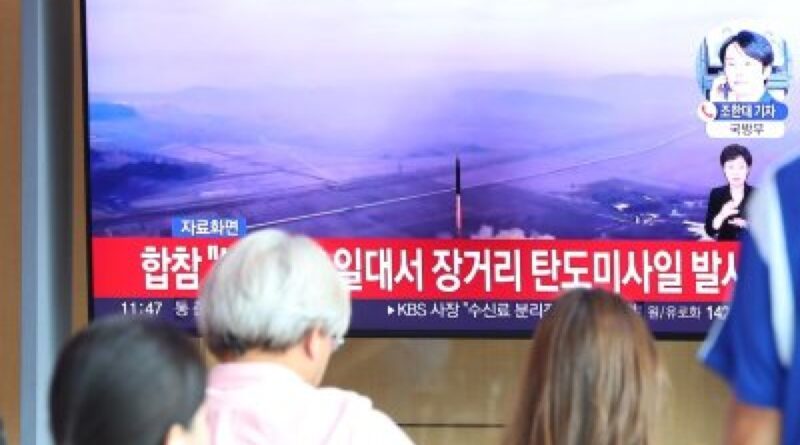North Korea launches intercontinental ballistic missile into sea after warnings to U.S.
North Korea fired an ICBM Wednesday, defense officials in Tokyo and Seoul said, ahead of a sideline meeting between Japanese Prime Minister Fumio Kishida and South Korean President Yoon Suk-yeol at the NATO Summit in Lithuania. Photo by Yonhap
SEOUL, July 12 (UPI) — North Korea fired an intercontinental ballistic missile into the sea between Korea and Japan on Wednesday, Seoul and Tokyo said, days after threatening the United States over alleged reconnaissance flights.
The missile was launched from the Pyongyang area at 10 a.m. and traveled at a lofted angle for roughly 621 miles, South Korea’s Joint Chiefs of Staff said in a message to reporters.
“We strongly condemn North Korea’s long-range ballistic missile launch as a serious provocation that harms peace and stability on the Korean Peninsula as well as the international community, and is in clear violation of U.N. Security Council resolutions,” the JCS said.
Japan’s Defense Ministry said the missile reached a maximum altitude of over 3,700 miles and flew for around 74 minutes before splashing down in waters 155 miles west of Okushiri Island, outside the country’s exclusive economic zone.
The flight time of 74 minutes would be the longest ever recorded for a North Korean missile.
Chief Cabinet Secretary Hirokazu Matsuno, Tokyo’s top spokesman, called the launch “totally unacceptable” and said that Japan launched a protest against North Korea through its embassy in Beijing.
Matsuno added that Japan will work closely with the United States and South Korea to monitor the North’s missile and nuclear activities.
The launch took place after two days of warnings from Pyongyang over alleged U.S. spy plane flights above the waters of its exclusive economic zone.
Kim Yo Jong, the powerful sister of North Korean leader Kim Jong Un, claimed that the North’s warplanes chased off a U.S. reconnaissance aircraft on Monday and said a “shocking incident would occur” if the flights continued.
The missile test also came before a planned meeting Wednesday between Japanese Prime Minister Fumio Kishida and South Korean President Yoon Suk-yeol in Lithuania, where both are attending the North American Treaty Organization summit as guests.
Seoul and Tokyo have improved relations and stepped up trilateral defense cooperation with Washington amid the growing nuclear threat posed by North Korea.
Yoon convened an emergency meeting of the National Security Council from Vilnius, his office said.
“North Korea’s provocation was made during the NATO summit to discuss global security cooperation, and we will call for strong solidarity from the international community,” Yoon said.
Pyongyang last fired an ICBM in April, when it tested the Hwasong-18, a new solid-fuel missile that is potentially more maneuverable and quicker to launch than liquid-fuel models.
The secretive regime also recently attempted to deploy its first military reconnaissance satellite, citing a need to respond to the “undisguised military threat” of U.S. and South Korean forces.
The rocket carrying the satellite crashed into the Yellow Sea shortly after launch on May 31 due to a second-stage engine failure.

